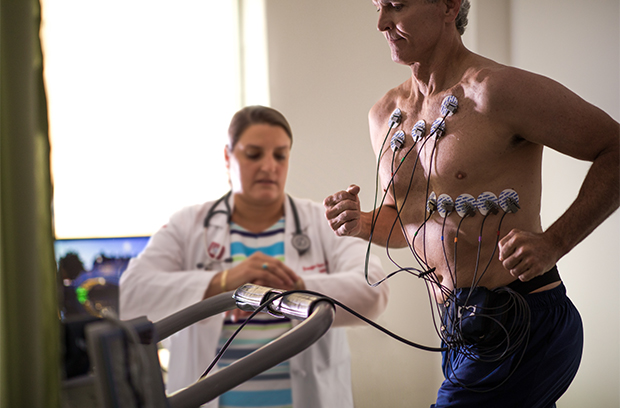What Is Myocarditis?
Myocarditis is an inflammation of the heart tissue, specifically the myocardium, the middle layer of the heart wall. Myocarditis affects your heart's electrical system and muscle cells, leading to irregular heart rhythms and problems with your heart's pumping function. In severe cases, your heart becomes too weak to adequately pump enough blood to the rest of your body. You're also more susceptible to clots forming in your heart, which could lead to a stroke or heart attack.
Most cases of myocarditis are caused by an infection.
What are the Symptoms of Myocarditis?
Many people may exhibit no noticeable signs of myocarditis. You may feel sick or have some general viral symptoms but you may not know that your heart is being affected. If your condition does produce symptoms, you can expect to experience any or all of the following:
- Signs of a viral infection, such as body aches, joint pain, fever, headaches, vomiting, diarrhea or a sore throat.
- Rapid or abnormal heart rhythms (arrhythmias).
- Chest pain.
- Shortness of breath, both at rest and during physical activity.
- Swelling of your lower extremities (legs, ankles and feet).
- Fatigue.
If you’ve experienced a viral infection and begin to have chest pain, arrhythmia or shortness of breath, be sure to make your physician aware.
Diagnosis of Myocarditis
Your physician will take a detailed medical history and go over the symptoms you're experiencing. To confirm the diagnosis, you may undergo any or all of the following tests:
- Electrocardiogram (EKG)
- Chest X-ray
- MRI
- Blood tests.
- Cardiac catheterization.
- Echocardiogram.
Once a detailed diagnosis is reached, your physician will determine the best treatment options for you.
Treatment at Penn
For many people with mild cases, myocarditis usually improves on its own or with medication. With rest and antibiotics to fight the infection, you may experience a complete recovery.
However, if your myocarditis is causing more issues with your heart, such as irregular heartbeats or heart failure, you will most likely need further treatments and hospitalization.
If your condition requires more intervention, such as hospitalization, intravenous medication, surgery or ventricular assist devices, know that Penn is a national leader in heart failure and transplantation. Penn Medicine's specialized cardiologists and surgeons offer medical treatments not available at other centers and treat some of the most complex cardiac conditions.
When you choose Penn for your treatment, you choose to work with a dedicated team offering the most innovative treatments and surgeries. Penn physicians continue to lead the field, advancing the science of cardiac care.
Penn Programs & Services for Myocarditis

Offers patients with cardiovascular disease the highest level of medical expertise

Our Heart Transplant Program features nationally renowned experts and comprehensive care tailored to you and your family's unique needs.